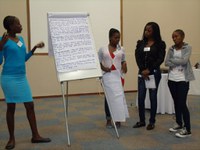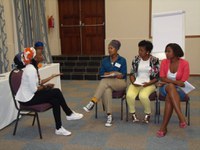Mobilising young women for change
Sexual assault is a major social ill with some Human Rights organisations stating that as many as 40% of South African women are likely to be raped in their lifetime.
The National Strategic Plan on HIV /AIDSs and TB, identifies young women aged 15-24 to be a key population who are more likely to be exposed to, or to transmit these infections. With young South African women being one of the most vulnerable sectors of the population, Soul City Institute (SCI) is launching a large-scale population based intervention for young women aimed at reducing new HIV infections. This initiative is being supported largely by a grant awarded to SCI by the Global Fund.
Young Women’s Clubs are a SCI initiative aimed at mobilising and empowering Young Women to participate in taking responsible action to shape their lives and the communities they live in. The clubs will focus on active participation of young women aged 15-24 years who may be in or out of schools, residing in high risk areas, particularly informal settlements.
Members will manage their own clubs with the back-up of skilled field support structures, magazines, television and social media. The programme will adopt a prevention approach that considers biomedical, behavioural and structural interventions. Some key themes will include:
- female and male condom use
- enhancing risk perception of transactional and intergenerational sex
- increasing access to HCT and contraceptive services
- tackling alcohol misuse
- addressing gender based violence and
- supporting career and enterprise development
- career guidance
 Mentors will be trained to interact and support the clubs on an ongoing basis.
Mentors will be trained to interact and support the clubs on an ongoing basis.
Young Women’s Clubs will provide much needed positive peer interaction and platforms from which to share and grow. These young women can not only be greater than their circumstance but educate their families, strengthen family and community structures and contribute to a decrease in risk of violence. Women’s empowerment remains intertwined with gender equality, socio economic development and human rights.

